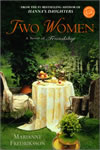Two Women
Two middle-aged women meet at a garden store in a suburban town in Sweden. Inge Bertilsson is divorced, a former school teacher who has become a successful writer. She has two wonderful adult daughters. Mira Narvaes, a widow, fled Pinochet's terror in Chile and is now a citizen of Sweden. She has wonderful sons. Both women like to garden. Both have secrets.
For Fredriksson, the great virtue of the Swedish woman is the ability of cheerfully assess what work needs doing and to set about it without fuss or delay. When the power fails and the frozen fish starts to thaw, we make astonishing quantities of fish soup and launch a family tradition, and every year at this time we now gather from distant lands and strange occupations and make fish soup. This is her theme here, as in her great first novel, Hannah's Daughters. And here, too, the spectre of rape dominates the past. But where Fredriksson used formulaic constraints of ethnic epic to cleverly cross-brace Hannah's Daughters, here they are merely applied and obeyed: Mira is a convenient outside viewpoint on the Swedish Family, Inge is a handy domestic rock against which to set Pinochet. But it's all so neat and convenient that it requires us to believe that God is also a Swedish mother, fussing to provide exactly the right characters with precisely the right personalities and to give them exactly the right opportunity to witness, and then to remember again one sunny afternoon on the sunny garden porch, over tea, not far from Goteborg.
